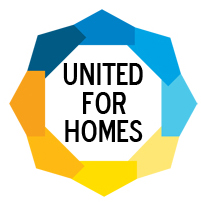New Dear Colleague Letter on H.R. 1662, the “Common Sense Housing Investment Act”
Sep 21, 2015
 Representative Keith Ellison (D-MN) is circulating a new “Dear Colleague” letter that asks Members of the House of Representatives to cosponsor his “Common Sense Housing Investment Act of 2015” (H.R. 1662) to help combat the rise of child homelessness and ensure every child has a safe home. The bill includes the United for Homes campaign’s proposed modifications to the mortgage interest deduction (MID), and would direct the majority of the revenue saved by the modifications to the National Housing Trust Fund.
Representative Keith Ellison (D-MN) is circulating a new “Dear Colleague” letter that asks Members of the House of Representatives to cosponsor his “Common Sense Housing Investment Act of 2015” (H.R. 1662) to help combat the rise of child homelessness and ensure every child has a safe home. The bill includes the United for Homes campaign’s proposed modifications to the mortgage interest deduction (MID), and would direct the majority of the revenue saved by the modifications to the National Housing Trust Fund.
In his letter, Mr. Ellison cites new data from a Department of Education report showing an 8% increase in child homelessness since 2012-2013 (see article elsewhere in Memo). Mr. Ellison states, “We now have more than 1.3 million homeless children, up from 679,724 before the Financial Crisis. This is an alarming byproduct of the terrible rental housing crisis we face. This rise in child homelessness is due to inadequate – and declining – federal assistance for rental housing. Yet, generous benefits for homeownership remain untouched.”
Mr. Ellison cited a recent report issued by the Congressional Budget Office (see Memo, 9/14) that states: “In 2014 the federal government provided $51 billion in low-income housing assistance. . . . By comparison, the federal government provided much more support for housing that does not depend on the income of the household. . . . That support, which amounted to about $130 billion in 2014, mostly takes the form of preferential tax treatment—that is, tax expenditures—for homeowners. The tax deduction for mortgage interest payments on owner-occupied residences accounts for most of those tax expenditures and accrues mostly to tax filers in the highest income quintile.”
The United for Homes campaign proposes to modify the current MID by a) reducing the size of a mortgage eligible for a tax break from the current $1 million to $500,000 (fewer than 4.6% of mortgages originated nationwide from 2011 to 2013 were over $500,000, and people with mortgages over $500,000 would still receive a tax break on the first $500K of their mortgage) and b) converting the deduction to a 15% non-refundable tax credit. Phased in over five years, these two changes would create an additional $230 billion in revenue over ten years for affordable housing without adding a penny to the federal deficit. The changes would also expand mortgage interest tax benefits to 16 million more households, 99% of whom have incomes below $100,000.
Over 2,200 national, state, and local organizations have joined the United for Homes campaign. To join the campaign, go to www.unitedforhomes.org.
Funding the NHTF with revenue raised by modifying the MID is one of NLIHC’s top policy priorities. NLIHC calls on all advocates to urge their Representatives to cosponsor the bill.
Read the Dear Colleague at http://nlihc.org/sites/default/files/Dear-Colleague-Letter_MID-Reform-Bill.pdf
More information about mortgage interest reform is at http://nlihc.org/unitedforhomes/proposal and on page 3-19 of NLIHC’s 2015 Advocates’ Guide, http://nlihc.org/library/guides